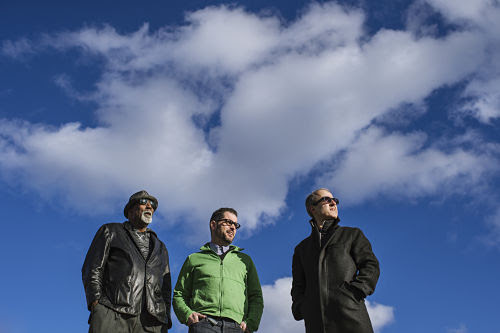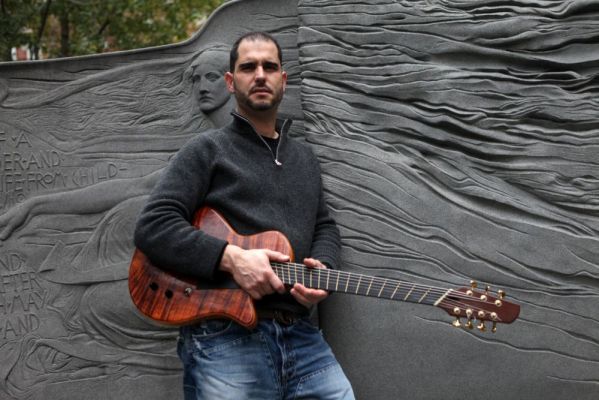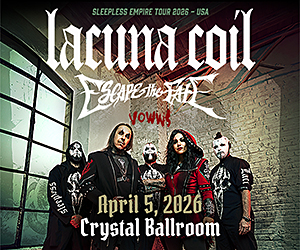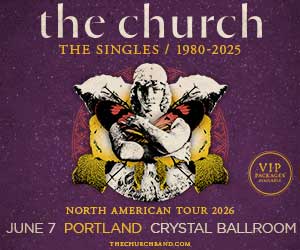Home > Jazz / Blues
12/09/2015
Charlie Hunter: The Primacy of Time and Feel - Q&A
By NATHAN RIZZO //
"You’ve got to connect with people. And I feel like whatever you want to call “Jazz” has reached a point of technical exhaustion in terms of its connection with people who are not musicians." At Mississippi Studios, Friday, December 11.
One of the most original stylists in modern jazz, Charlie Hunter’s deeply rhythmic blend of bass and guitar, made possible by hybrid seven and eight-string fanned-fret instruments (made by Eugene luthier Ralph Novak) and an astounding technique, has led to broad praise from inveterate jazz publications like Downbeat and JazzTimes to a contract with Blue Note Records and performance and writing collaborations with the likes of D’Angelo, Frank Ocean, John Mayer, and Norah Jones.
On Friday, December 11, Hunter will perform at Portland’s Mississippi Studios accompanied by a superb backing band of drummer Bobby Previte and Jazz Passengers trombonist Curtis Fowlkes. Interviewed in advance of this appearance, Hunter touches on the primacy of time and feel on Let The Bells Ring On, his latest release on his eponymous label. Hunter also recalls the teachings of Joe Satriani and the influence of legendary solo jazz guitarist Joe Pass before closing with reflections on the Public Domain project and his thoughts on the qualitative aspects of contemporary music.
Let’s start with Let The Bells Ring On, which was released this summer. I liked how grooving the album is, especially on tracks like “Welcome to Nutley.” However, I was really struck by the space within each song. Was that something you were consciously trying to emphasize?
Well, yeah! I’m glad someone picked up on that. And not just leaving space for everybody, but having everybody leave space. Because otherwise, if you just start swinging for the fences and all you have is a trio, then it gets pretty crowded pretty quickly.
In terms of playing, is the presence of that kind of room in a song ever intimidating? Does it go against your nature to sit back and not play in situations like that?
Oh, no - it’s part of it [laughs].
My guitar teacher, Dan Balmer, often performs with a bassist and drummer as a trio, and has mentioned how hard that can be because of the additional energy and momentum each member of the ensemble is responsible to bring. For some musicians, I feel like it could be a pretty unsettling experience.
Well, yeah. But also, Dan’s occupying a different position in the music than I am. When you have that much ability and can play that much harmony and melody, you’re going to want to go that direction. But my thing is entirely based on rhythm and rhythmic counterpoint, and being the hub - more like the drummer, through which things flow.
That’s the way I’m thinking about the music, so it’s different. It’s easier to make more of an impact playing less, because the area that I’m representing is kind of wider, you know?
As a listener, I felt challenged. I went through the album three or four times before I really got it. I found myself feeling anxious and wondering when people were going to play [laughs]. Then I finally sat back and tried to focus on the groove and feel a bit more, and that’s when I felt like I understood what was going on.
I pretty much gave the guys [drummer Bobby Previte and trombonist Curtis Fowlkes] the direction of like, “This is not a jazz record. Do not think of it like jazz. Think of it like we’re a backing band for an R&B singer and this is what we do when we’re waiting for that person to show up.” Or to think in terms of what a blues player would do; think in those terms and not about having lots of linear flurries. None of that kind of stuff.
If anything, probably the most lyrical soloist is Bobby [Previte] on the drums on that record. And that’s a thing that I like more than a guitar playing lots of stuff; it’s just my own personal taste.
I don’t believe people think of drumming in that respect very often. A few weeks ago, I did an interview with Antonio Sanchez, who plays with Pat Metheny and did the Birdman score, and he touched on the subject.
Yeah, he’s great! And that’s a great soundtrack, too.
Oh, he’s amazing. I remember him saying that when he does clinics, he stresses that drums can be a really melodic instrument, and not just in terms of pitch melodies; drummers can use rhythm and other devices to become a principal voice within a group - not just accompaniment.
Yeah, because then it becomes a lot less technical and a lot more about expression.

I know you studied with Joe Satriani when you lived in the Bay Area. Did he ever talk about things like phrasing and space? I feel like his attention to those aspects of music performance are a big part of what sets him apart from a lot of the people who’ve followed him along the path of instrumental rock guitar.
Well, you know, I was too young. I was just like everyone else in my town in that respect. Everyone took lessons from him, you know? But he was very different, even at that age. He was coming out of the New York City scene in the early ‘70s, and he studied with Lenny Tristano and Billy Bauer. His background is very different.
I think he even invented a lot of that kind of guitar playing, and that’s something that people don’t realize. It’s just like with Michael Brecker. It’s easy to forget how great of a musician and a trailblazer that guy was, because so many people that are kind of making a career trying to sound like him. But they’re ultimately missing the main point of what he does. And with Satriani, it’s probably a very similar thing.
With me, his thing was how to physically play the instrument and “You might want to check out James Brown,” or “you might want to check this out.”
So he was really hip to a lot of stuff.
Oh, yeah! He’s a music guy. He chose an interesting path, but he’s always been a music guy. That’s where he comes from.
He used to take me to see his band; he had a group named The Squares in Berkeley. It was a trio and they all sang. It was pretty awesome! And I didn’t even know that he was a big name until later on because I was a street-musician living in Europe and he was in Berkeley, so I didn’t even know.
On the subject of guitar players, I understand that you’ve looked to the playing of Joe Pass. Is that accurate?
Sure! Of course.
Can you point to any particular concepts you’ve drawn from him? When you’re playing chords over a bass line, it can be so reminiscent of something that he would play.
Yeah, you know, a lot of that I got from a live solo record of his. I was like, “Holy fuck, this is insane!” I spent a lot of time trying to learn how to play that. Remember, this was at a time when there were no videos of him playing. I couldn’t afford to go see him play, so I was just like, “How does this work?” I would go and read articles; it wasn’t like going on YouTube and just being like “Hey, awesome,” you know?
So yeah, that was a big influence for me and, I think, for a lot of people. It might not always sound like it, but definitely in terms of learning tunes and harmony on the fretboard. I think you have to go through that.
Did the process of really having to sit down with his music and figure it out on your own lead you to absorb it more deeply?
I think it did, because I didn’t know anything. I didn’t know how to read and I didn’t know any music theory. I mean, I knew the names of the strings [laughs]. So I was just learning it through listening to it and trying to figure out what it all meant.
Dan [Balmer] often says that for the younger generation of musicians, knowledge - especially harmonic - is almost too readily available; that people know everything yet they also know nothing.
Yeah. You know what it is? It’s not hard-fought for you guys, in a way. Your fight is different than our fight. Your fight is: there’s so much noise, it’s impossible to get any bandwidth for yourself. And within that bandwidth, you can get caught up in a sort of race to the bottom in terms of trying to be the most outlandish. But I definitely think it’s easy for your generation to fall into that mile-wide-and-an-inch-deep syndrome.
That’s a good way of putting it.
But, I mean, I’m sure the generation before us had their shit they said about us [laughs].
When you played here as a part of the Portland Jazz Festival in 2012, you performed several selections from Public Domain, which was an album of songs like “Danny Boy” and “Saint Louis Blues” you had recorded for your 104 year-old grandfather. In your opinion, is there any contemporary popular music that, on the basis of its substance, people are going to reinterpret and play on a record like Public Domain when you’re his age?
I just don’t think there’s that linear thing. I mean, we want it to be that way because it’s convenient. It’s convenient to think that there’s a lineage from Louis Armstrong and Fats Navarro to Dizzy Gillespie and Miles Davis. Maybe it works there, but there’s no real socio-political lineage from Miles Davis to whoever’s a big trumpet player today. It’s a whole different thing. I might see more of a lineage from Miles Davis to Chuck D, you know?
But I don’t know if those songs will have the same meaning to people.
I was thinking more in terms of broader timelessness. I feel like musicians still play standards like “Skylark” on the basis of their quality, and I wonder what, if anything, from today is going to hold up like that.
You know, you can’t beat that formula. You really can’t. The standard song; the way those things were written, you just can’t beat it. And it’s the same way - you can’t beat a jazz piano trio. It works so well. But it is its thing, you know? And who is pushing the envelope with that? It’s hard to do at this point. It kind of reached technical exhaustion.
Do you feel like there are stylistic or paradigmatic endpoints in music?
Well, I don’t know, because there are still people who play the viola da gamba and all that stuff, and it really is meaningful to them. Who am I to say that that’s the wrong thing to do?
But I definitely think that there was a time when that was much more of a thing, the way an organ trio was a thing; you played in an organ bar and there was a groove. It was a thing and a culture surrounding it. But does that culture exist anymore? Probably not, even though it works really well.
Antonio had some great thoughts on oversaturation in modern music; “noise,” as you’d mentioned earlier. Is there a way through it?
You’ve got to connect with people. And I feel like whatever you want to call “jazz” has reached a point of technical exhaustion in terms of its connection with people who are not musicians. So much of it revolves around kind of an institutionalized teaching and education, and I think that, whatever it is, you have to reach people and be open-minded to what reaches people and what makes that thing happen. Because that’s what really matters.








